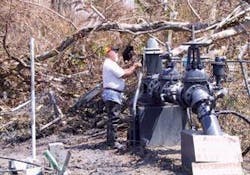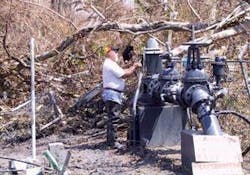Water Groups Extend Helping Hand
In the days after Hurricane Katrina swept ashore, EPA estimated that 1,223 drinking water systems and at least 213 wastewater systems were affected by the hurricane. Damages ranged from simple power outages to significant wind and flood damage to treatment facilities across the Gulf Coast region
In a report issued Sept. 5, EPA said affected drinking water facilities included 72 in Alabama, 683 in Louisiana and 468 in Mississippi. EPA sent a large force into the storm-damaged area to assess damage, inspect facilities and help with drinking water analysis.
Water groups were quick to respond with offers of aid to communities in Louisiana, Mississippi and Alabama stricken by Hurricane Katrina.
The American Water Works Association (AWWA) asked its 57,000 members to offer professional expertise, water-related equipment, supplies, and other resources.
AWWA urged its member utilities, manufacturers, consultants and individuals to place offers of assistance into an online federal database -- The National Emergency Resource Registry (NERR) -- that relief workers could use to match resources with needs.
After the hurricane struck, AWWA officials conferred with the Environmental Protection Agency (EPA), the Department of Homeland Security (DHS), the Federal Emergency Management Agency, the affected states and other water organizations to determine the best way to marshal the resources and expertise of the water community.
“The outpouring of support for hurricane victims from AWWA members and sections has been remarkable,” said AWWA President Andy Richardson. “From the moment the scope of the damage became apparent, AWWA’s phones and email boxes have been inundated with offers of material, financial and professional support.”
The Water Environment Federation (WEF) also was working through NERR.
Executive director Bill Bertera said, “WEF continues to coordinate with federal, state, and local government officials to provide support directly to water sector (wastewater and drinking water) utilities in the Gulf Coast region.”
“Activated at the request of the Homeland Security Operations Center, the NERR stands ready to assist with coordination efforts between the resources that are needed and the resources that may be available from the private and public sectors.”

